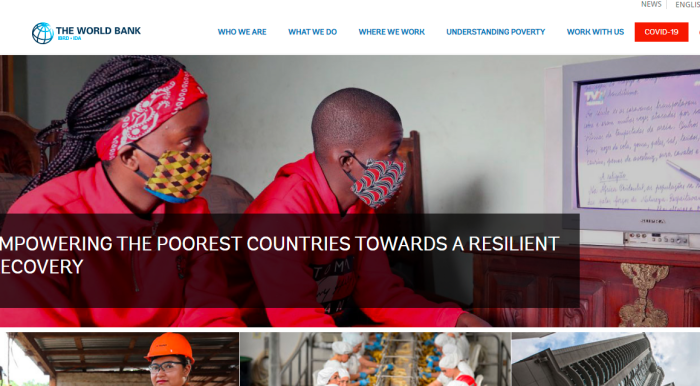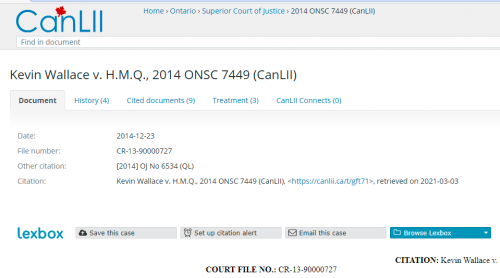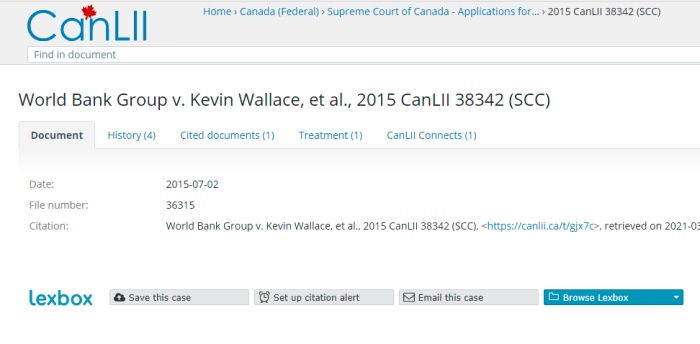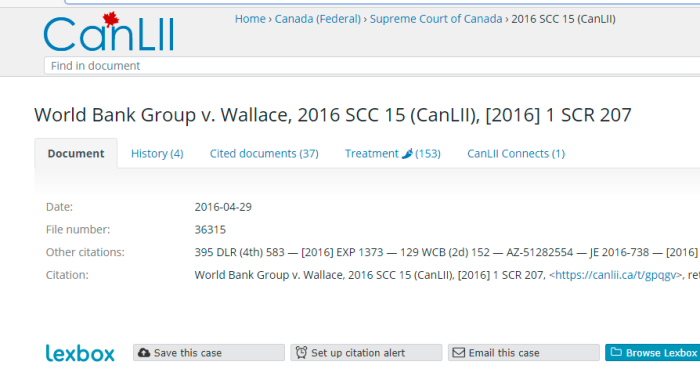
This is a case from several years ago. The World Bank Group (WBG) went to the Supreme Court to get an Order overturned, which compelled the organization to turn over documents in a criminal case. WBG itself was not being tried, but they had information that was potentially valuable to the accused defendants. They were charged under the Corruption of Foreign Public Officials Act, and some were employees of SNC Lavalin.
1. More On The International Banking Cartel
For more on the banking cartel, check this page. The Canadian Government, like so many others, has sold out the independence and sovereignty of its monetary system to foreign interests. BIS, like its central banks, exceed their agenda and try to influence other social agendas. See who is really controlling things, and the common lies that politicians and media figures tell. The bankers work with the climate mafia and pandemic pushers to promote mutual goals of control and debt slavery.
2. Court Rulings On World Bank
Kevin Wallace v. H.M.Q., 2014 ONSC 7449 (CanLII)
https://www.canlii.org/en/on/onsc/doc/2014/2014onsc7449/2014onsc7449.html
World Bank Group v. Kevin Wallace, et al., 2015 CanLII 38342 (SCC)
https://www.canlii.org/en/ca/scc-l/doc/2015/2015canlii38342/2015canlii38342.html
World Bank Group v. Wallace, 2016 SCC 15 (CanLII), [2016] 1 SCR 207
https://www.canlii.org/en/ca/scc/doc/2016/2016scc15/2016scc15.html
3. Ontario Superior Court Ruling

NORDHEIMER J.:
.
[1] The applicants are all charged with an offence under the Corruption of Foreign Public Officials Act, S.C. 1998, c. 34. They bring this application for an order requiring a third party, the World Bank Group, to produce various documents. In furtherance of that application, the applicants had subpoenas issued to two employees of the World Bank Group requiring them to appear before this court and bring with them various documents that were detailed in an appendix to the subpoenas. Neither of those individuals appeared in response to the subpoenas. I will address certain issues regarding these subpoenas later.
Background
.
[2] Some degree of factual background is necessary to understand the reason for this application. The applicants are jointly charged with one count of bribing foreign public officials, namely, officials within the government of The People’s Republic of Bangladesh. Three of the accused persons are former employees of SNC-Lavalin. Mohammad Ismail was Director, International Projects. Mr. Ismail reported to Ramesh Shah who was Vice-President of the International Division. Mr. Shah reported to Kevin Wallace who was Vice-President, Energy and Infrastructure, and was the senior SNC-Lavalin executive assigned to the Padma Project. Zulfiquar Ali Bhuiyan is a Bangladeshi and Canadian Citizen. It is alleged that Mr. Bhuiyan was the representative of Abul Chowdhury, a senior Bangladeshi official, who was alleged to also be involved in this matter.
[3] The background to this matter dates back to 2010 when the World Bank began receiving information suggesting that there might be corruption involving foreign public officials and company representatives in respect of a bid by SNC-Lavalin for a construction supervision contract related to the planned construction of the Padma Bridge in Bangladesh. The World Bank Group was a primary lender in relation to the Padma Bridge project.
[4] The Word Bank Group has a unit that is charged with the investigation of allegations of fraud, corruption, collusion and other improper activities in relation to World Bank financed projects. It is called the Vice Presidency for Integrity (“the INT”). In March, 2011, an officer with the Royal Canadian Mounted Police was approached by an INT investigator concerning allegations that had come to the INT’s attention regarding possible corruption involving SNC-Lavalin and the Padma Bridge project.
Conclusion
.
[67] In summary, I conclude that:
(i) the subpoenas for Christopher Kim and Paul Haynes were validly served;
.
(ii) the World Bank Group has, on the particular facts of this case, waived their immunity such that this court has jurisdiction to order production of documents in their possession;
.
(iii) the applicants have satisfied the first stage for the production of records in the hands of a third party as set out in R. v. O’Connor;
.
(iv) the World Bank Group must produce to this court the documents set out in paragraphs a, b, c and e of the Appendix to the subpoenas so that the review contemplated in the second stage of the R. v. O’Connor procedure can take place;
.
(v) if the applicants still wish to pursue the documents referred to in paragaraphs d and f of the Appendix to the subpoenas, a further hearing should be arranged to address the relevance of those documents.
The details of the criminal fraud itself isn’t what’s so interesting here. It’s the fact that the Defendants attempted to force the WBG to produce documents which they claimed was relevant to their defense. Was this really about privacy, and exerting their immunities privilege? Or, was there some other, more basic reason WBG wouldn’t want this information to be public record?
4. Supreme Court Motion For Leave

The motion to expedite the application for leave to appeal is granted. The application for leave to appeal from the judgment of the Ontario Superior Court of Justice, Number CR-13-90000727, 2014 ONSC 7449, dated December 23, 2014, is granted.
The Supreme Court of Canada granted the application to appeal and expedite the challenge from the Ontario Superior Court. Rather than comply, WBG decided to get the Order thrown out instead.
5. Supreme Court Overturns ONSC Ruling

Two issues were raised on the application: (1) whether the World Bank Group could be subject to a production order issued by a Canadian court given the immunities accorded to the IBRD and the IDA, and (2) if so, whether in the context of a challenge to the wiretap authorizations pursuant to Garofoli, the documents sought met the test for relevance.
With respect to the first issue, the trial judge found that the immunities and privileges claimed were prima facie applicable to the archives and personnel of the INT. However, he determined that the World Bank Group had waived these immunities by participating in the RCMP investigation. In any event, he was not persuaded that the documents at issue were “archives”. Moreover, in his view, the term “inviolable” in the Articles of Agreement connoted protection from search and seizure or confiscation, but not from production for inspection. On the second issue, the trial judge concluded that the documents were likely relevant to issues that would arise on a Garofoli application. Accordingly, he ordered that the documents be produced for review by the court.
.
Held: The appeal should be allowed and the production order set aside.
The trial judge erred in assessing the accused’s arguments. Although he correctly placed the burden on the accused, he did not properly assess the relevance of the documents being sought. In particular, he blurred the distinction in a Garofoli application between the affiant’s knowledge and the knowledge of others involved in the investigation. In this case, that distinction is crucial. While the documents sought may be relevant to the ultimate truth of the allegations in the affidavits, they are not reasonably likely to be of probative value to what Sgt. D knew or ought to have known since he did not consult them. The accused have not shown that it was unreasonable for him to rely on the information he received from the INT and other officers. Furthermore, accepting the argument that the INT’s records should be presumed relevant because first party documents were lost or not created would require a significant change to the O’Connor framework. Such a change is not necessary. Any loss of information must be addressed through the remedial framework set forth in R. v. La, 1997 CanLII 309 (SCC), [1997] 2 S.C.R. 680, which may well be the appropriate framework for addressing any prejudice resulting from the World Bank Group’s assertion of its immunities. The accused did not argue these issues on this appeal, and they are best left to the trial judge.
[6] First, the World Bank Group submits that the Schedules of the Bretton Woods and Related Agreements Act, R.S.C. 1985, c. B-7 (“Bretton Woods Act”), grant immunity to the archives and personnel of certain constituent organizations of the World Bank Group, including the International Bank for Reconstruction and Development (“IBRD”) and the International Development Association (“IDA”). Under Schedules II and III of the Bretton Woods Act, the IBRD’s and the IDA’s “archives . . . shall be inviolable” (“archival immunity”), and “[a]ll [g]overnors, [e]xecutive [d]irectors, [a]lternates, officers and employees . . . (i) shall be immune from legal process with respect to acts performed by them in their official capacity except when the [IBRD or IDA] waives this immunity” (“personnel immunity”) (Sch. II, art. VII, ss. 5 and 8; Sch. III, art. VIII, ss. 5 and 8).
[7] Accordingly, the World Bank Group submits that the documents ordered produced by the trial judge are immune from production.
[12] SNC-Lavalin was one of several companies bidding for a contract to supervise the construction of the bridge (the “Supervision Contract”). A committee of Bangladeshi officials evaluated the bids. The respondents allegedly conspired to bribe the committee to award the contract to SNC-Lavalin. Three of the respondents are former employees of SNC-Lavalin: Kevin Wallace, Ramesh Shah and Mohammad Ismail. The fourth, Zulfiquar Bhuiyan, was allegedly a representative of Abul Chowdhury, a Bangladeshi official alleged to be involved in this matter. They are all charged with an offence under the Corruption of Foreign Public Officials Act.
[13] The INT is responsible for investigating allegations of fraud, corruption and collusion in relation to projects financed by the World Bank Group. The INT is an independent unit within the World Bank Group, reporting directly to its President. Mr. Haynes and Mr. Kim were senior investigators with the INT. Mr. Haynes was the primary investigator in this matter.
V. Conclusion
.
[148] The World Bank Group’s immunities cover the records sought and its personnel, and they have not been waived. Moreover, the INT’s records were not disclosable under Canadian law. In the result, we would dismiss the respondents’ motion to strike, allow the appeal and set aside the production order.
[149] In the circumstances, given the issues raised, we would make no order as to costs. In doing so, we wish to make it clear that we do not accept Mr. Bhuiyan’s submission as to the World Bank Group’s conduct in this case.
The Supreme Court of Canada ultimately found that the World Bank Group hadn’t waived its immunities, and was within its rights to refuse a request for production in a criminal case. The claim was that Canada’s membership with WBG came with certain conditions, and that this was still intact.
6. Relevance To What’s Happening Today
Considering that the World Bank Group is heavily involved in promoting the “pandemic” narrative, getting them to turn over material in any potential litigation will be very tricky. There are many, MANY things that real journalists and the public as a whole would want to see. This organization has power over Canadians, yet, we are not allowed to see the inner workings of how it operates.
This unfortunately is a very bad precedent, in terms of getting some transparency. And given the political connections Lavalin has, one has to wonder if there was interference in these proceedings.
